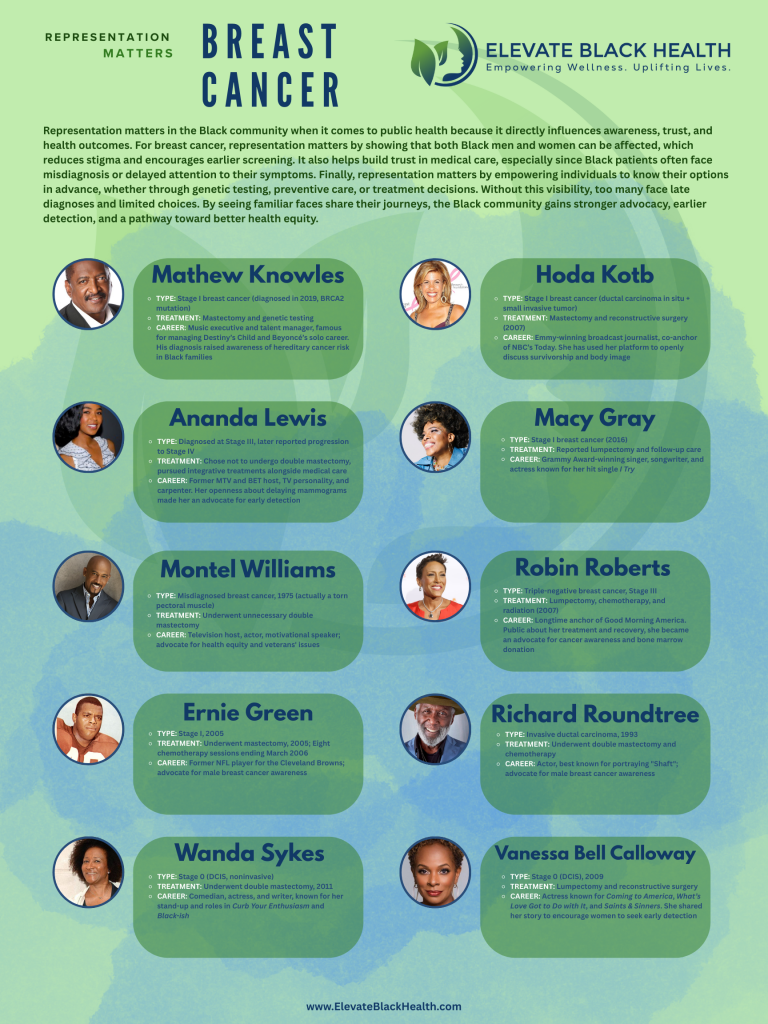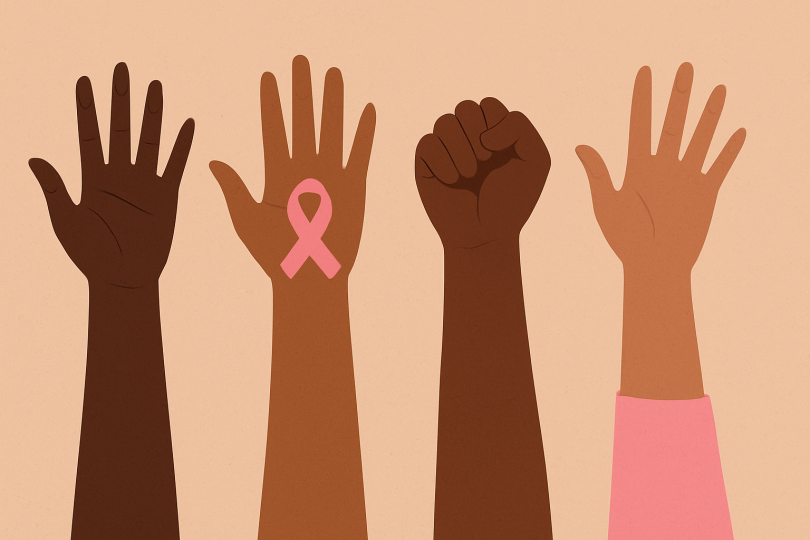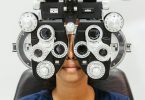Representation plays a critical role in how our community understands and responds to breast cancer. When prominent figures like Ananda Lewis publicly share their diagnosis and treatment journey, it challenges the idea that breast cancer is something that happens only to others—it becomes personal and real. Ananda Lewis, for instance, admitted she had been avoiding her mammograms, and later said, “My biggest mistake was the one I’ve shared from the beginning: not getting my mammograms.” That kind of honesty helps encourage earlier screenings and regular check-ups, which are vital: studies show that Black people who do not get mammograms regularly are three times more likely to be diagnosed at later stages (Stage 3 or 4) compared to those diagnosed at Stage 1.
Breast Cancer Stages:
- Stage 0: Non-invasive cancer confined to the milk ducts
- Stage I: Small tumor (≤2 cm), confined to the breast, with little to no lymph node involvement
- Stage II: Tumor 2–5 cm, or spread to a few nearby lymph nodes
- Stage III: Larger tumor (>5 cm) or extensive spread to multiple lymph nodes, possibly chest wall or skin involvement, but not distant organs
- Stage IV (Metastatic): Cancer has spread beyond the breast and nearby lymph nodes to other organs such as bones, liver, lungs, or brain
Representation also influences how treatment and after-care are approached. Seeing people who look like you discussing their decisions—whether to have surgery, chemotherapy, mastectomy, or alternative or integrative treatments—gives space for informed patient decisions. Ananda Lewis, diagnosed initially with Stage III breast cancer and later reporting progression to Stage IV, chose not to undergo a physician-recommended double mastectomy and instead pursued integrative methods alongside conventional advice. This decision was ultimately a part of her demise. The transparency in her story, though, can help others feel empowered to ask questions, insist on follow-ups, and adhere to treatment plans and aftercare. The data support that when follow-up after abnormal mammograms is delayed, survival worsens; Black women and men often experience these delays, contributing to higher mortality.
Finally, representation nurtures mental and emotional well-being in the Black community. It reduces isolation, stigma, and fear. When someone like Lewis shares not just triumphs but also regret, fear, and moral complexities such as her admission that early detection “changes your outcome. It can save [your] life.” it lets others see that they are not alone. This shared visibility helps with mental health, encouraging people to speak up, seek support, adhere to aftercare, and feel less shame or fear. Combined with statistics that Black women in the U.S. are about 40% more likely to die from breast cancer than white women, despite somewhat similar screening rates, these stories show how crucial not just medical care but culturally resonant representation is to closing that gap. (cancer.org)
For representation, let’s take a look at Black celebrities, both male and female, who have been affected by breast cancer. Click image for a free PDF download that will be sent to your email address.

While the number of Black celebrities who have publicly shared their breast cancer journey remains relatively small, their stories carry enormous weight. Figures like Ananda Lewis, Robin Roberts, and Richard Roundtree serve as powerful reminders that breast cancer affects our community in both women and men. Each story highlights the importance of early detection, regular screenings, and following through with treatment and aftercare. More importantly, these narratives help Black individuals feel seen and understood, reducing isolation and encouraging conversations about health that can save lives. Even though few have stepped forward, their courage illuminates the reality that breast cancer is not distant or abstract — it is part of our community, and awareness, education, and representation matter.
For additional reading:
- Key Statistics for Breast Cancer in Men — American Cancer Society
https://www.cancer.org/cancer/types/breast-cancer-in-men/about/key-statistics.html - Black Men Have Higher Incidence Rates for All Types of Breast Cancer — American Cancer Society
https://www.cancer.org/research/acs-research-highlights/breast-cancer-research-highlights/risk-factors-and-prevention-studies-breast-cancer/black-men-have-higher-incidence-rates-for-all-types-of-breast-cancer.html - Black/White Breast Cancer Subtype Incidence in Men Differs from Trends in Women — ACS / SEER / Press Release
https://pressroom.cancer.org/SungMaleBreastCancer2019 - Male Breast Cancer — African American Breast Cancer Alliance — AABCA, Inc.
https://aabcainc.org/male-breast-cancer/ - Clinicopathological characteristics and survival outcomes of male breast cancer according to race: A SEER population-based study — PubMed
https://pubmed.ncbi.nlm.nih.gov/29050233/ - Black Women Have a Higher Risk of Dying from All Types of Breast Cancer, Meta-Analysis Reveals — Mass General Brigham
https://www.massgeneralbrigham.org/en/about/newsroom/press-releases/black-women-have-higher-risk-of-dying-from-all-types-of-breast-cancer - Breast Cancer Death Rates Are Highest for Black Women — Again | Breast Cancer Facts & Figures, 2022-2024 — American Cancer Society
https://www.cancer.org/research/acs-research-news/breast-cancer-death-rates-are-highest-for-black-women-again.html - Disparities in Breast Cancer Screening and Diagnosis Among Black Women: A Path Toward Equity — Journal of Breast Imaging (Oxford Academic)
https://academic.oup.com/jbi/article/7/4/395/8211064 - Black Women and Breast Cancer: Disparities and Research — Breast Cancer Research Foundation (BCRF)
https://www.bcrf.org/about-breast-cancer/black-women-breast-cancer-disparities/ - Black Women and Breast Cancer Risk — Mass General Brigham
https://www.massgeneralbrigham.org/en/about/newsroom/articles/black-women-breast-cancer-risk








